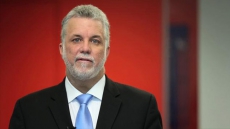TORONTO - An investment group that includes Wind Mobile founder Tony Lacavera and Canadian private equity firm West Face Capital has a tentative deal to buy out Wind's majority shareholder, VimpelCom Ltd., a Russian-Dutch company that has been trying to exit the Canadian market since it was blocked from gaining full ownership of the small wireless carrier last year.
Financial terms weren't included in the company's announcement.
It said the investment group, which also includes Tannenbaum Capital Partners, LG Capital Investors, Serruya Private Equity and Novus Wireless Communications, has arranged to buy out VimpelCom's majority stake — subject to regulatory approvals.
"With stable, long-term ownership and secure financing, Wind Mobile is moving into an exciting new phase," Lacavera said in a statement issued early Tuesday.
Lacavera, who owns about 35 per cent of Wind Mobile through Globalive, has been attempting to position it as a significant competitor to Canada's three biggest carriers, which collectively have about 90 per cent of the total subscriber base.
Though Wind hasn't faced the same type of financial problems that pushed Mobilicity and Public Mobile into court-supervised protection, it has had difficulty raising funds for capital investments that could speed its growth by allowing it to expand and improve its own network.
Wind currently has about 750,000 customers, or less than 10 per cent of any of the Big Three: Rogers (TSX:RCI.B), Telus (TSX:T) and BCE's Bell (TSX:BCE).
Its network is concentrated in populated areas of Ontario, Alberta and British Columbia but requires access to one of the Big three's national networks or partnerships with other small carriers, and likely will for some time to come. It also wants to invest in additional spectrum licences.
Greg Boland, president and chief executive officer of West Face Capital, said in the statement that the government's support for long-term competition in the wireless sector "has not gone unnoticed by the investment community."
Industry Canada has taken a number of other steps that have been favourable to Wind — including capping how much the big three carriers can charge for traffic that use their larger national networks — but Wind's access to foreign investment for further growth was hurt by Ottawa's decision to block VimpelCom from buying Lacavera's portion of the business last year.
A VimpelCom subsidiary helped fund Wind Mobile's entry into Canada's wireless industry about five years ago but the federal government blocked the European telecom company from acquiring full control last year, citing unspecified security concerns.
VimpelCom later refused to fund Wind's participation in the January 2014 auction of high-quality wireless spectrum that could have helped the company improve or expand its services.





